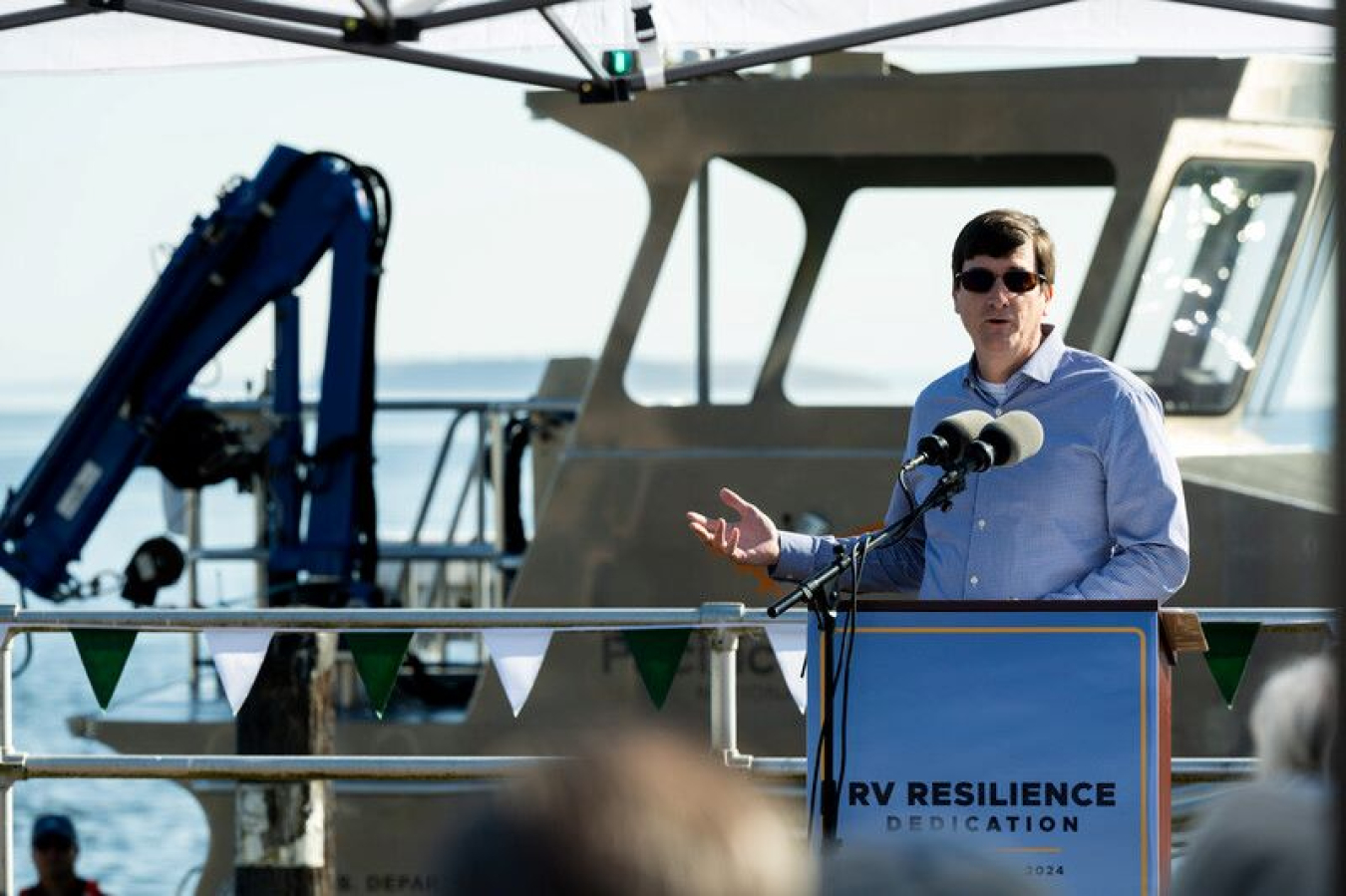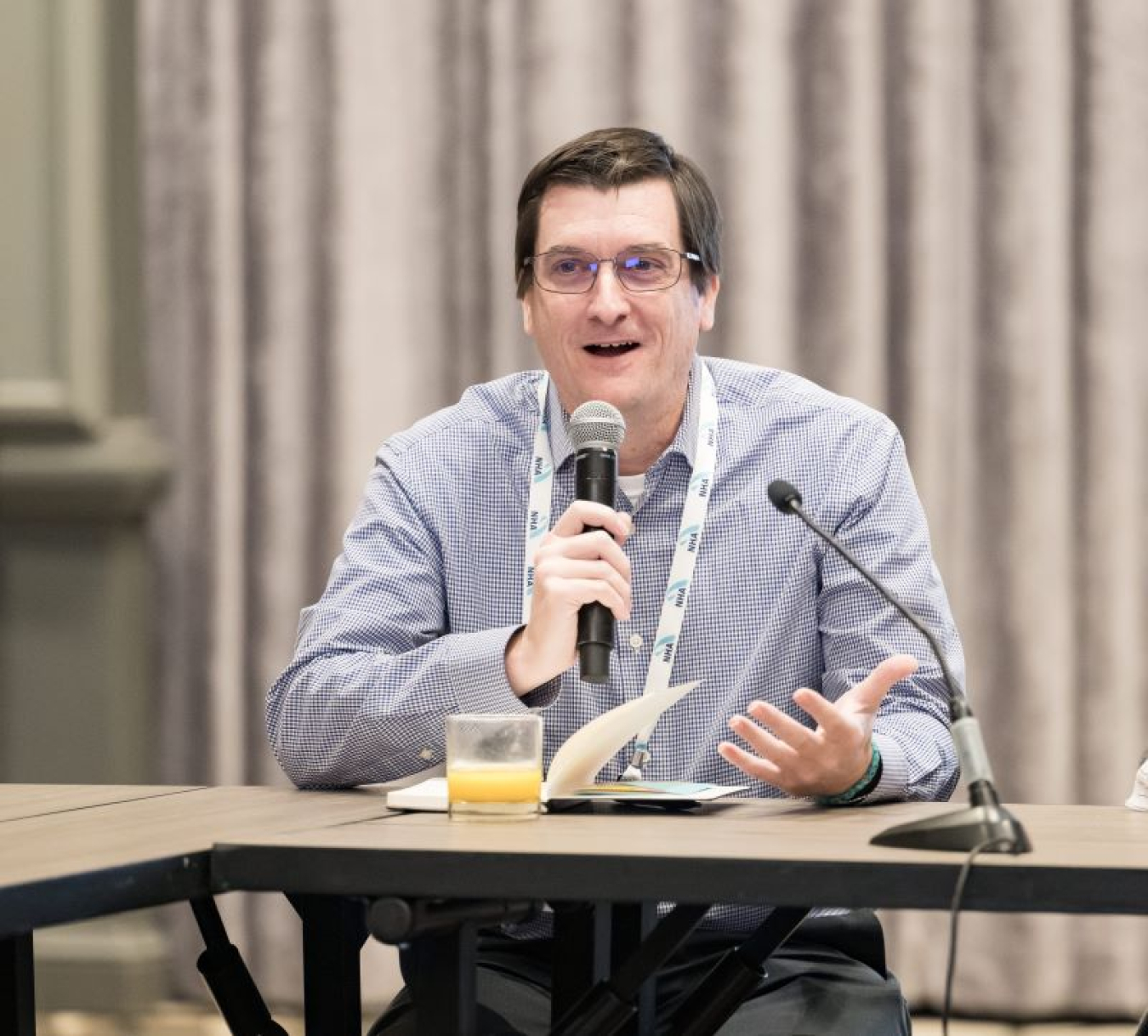Matthew Grosso, Director of the U.S. Department of Energy’s Water Power Technologies Office, shares how his childhood interest in history and inspiration from Abraham Lincoln led him to become a leader in public service.
Water Power Technologies Office
October 24, 2024Matthew Grosso once stopped at a local bookstore in a small town he was visiting. Well, “once” isn’t quite accurate. Grosso seeks out local bookstores; it’s one of his favorite pastimes. But this one was special. Inside, rising two stories high, was a tower of books written exclusively about Abraham Lincoln.
“It wasn’t just 100 copies of the same book,” Grosso said. “They were all different.”
As a kid, Grosso wanted to know everything about Lincoln’s presidency. Later, he dug deeper into Lincoln’s Civil War era. But as Grosso took on more leadership roles as an adult, he had questions about the man himself: his leadership style, motivations, and morals. “You start asking questions about what you really believe in,” Grosso said. “Like, ‘What kind of mark do I want to leave?’”
One thing Grosso has always believed in is public service. By high school, he had rejected what he calls his original “fantasies”—previously he had wanted to be a doctor, then a lawyer, then a baseball player. Instead, Lincoln inspired Grosso, a kid growing up in a working-class family in Florida, to pursue public service—and aim high.

“Lincoln started as a poor kid in a log cabin, and he rose to greatness. That’s quintessentially American,” Grosso said. “It was a good lesson that I don’t have to feel any limitations. I’m going to go as far as my capabilities take me—no excuses—and hopefully do some good along the way.”
Grosso, who just became director of the U.S. Department of Energy’s (DOE’s) Water Power Technologies Office (WPTO), has done just that. He rose from a city hall internship to a state-level budget office and then into federal government, where he’s helped direct work to modernize the U.S. power grid, revamp how the government performs surveys, and build WPTO from scratch.
Now, after about nine years, Grosso leads the office he helped grow. “To me, it’s a natural progression to take this mature, highly functional, highly accomplished office the rest of the way,” Grosso said. “We’ve got ambitious goals for where we want to be 10 or 20 years from now, and we've been building up to a point where we could launch into that sprint. I know what we need to do to get there.”
In this Q&A, Grosso shared how he started his government experience at his local city hall, how he then pivoted to a career that blended public service and science, and why he sees great promise in both marine energy and hydropower.
-
Even as a young kid, you were so certain you wanted to go into public service. Why?
There wasn’t one ‘Aha!’ moment. It happened over time, which fits my brand. I’m analytical. I take time to think about things and move gradually. I liked reading history, especially U.S. history, and that gave me a window into how leaders steered the country through turbulent times. My dad worked for a contractor that did both defense and space work—maybe that’s where the science crept in. I had posters of jets and spacecraft hanging in my room. And my family would talk about politics.
So, government seemed like a logical career path then.
Even in high school, I knew I wanted to go into a government career, so I went to Florida State University and got a master’s in public administration. Fortunately, my town’s city manager had an internship program, and he encouraged me to apply. I interned with his office over the summer during my college years, and that helped put real experience behind my desire to be in public service. At the local level, a sense of community spirit is really there. You’re dealing with problems local citizens have, and I learned there are a lot of business skills needed.
What did you do after you graduated with your master’s degree?
I worked at a think tank in Tallahassee that focused on state government issues. It was interesting but not fulfilling, so I didn’t stay there long. There weren’t a lot of government employment opportunities in Florida at the time, so I started looking out of state and ended up going to Richmond, Virginia, to join the state budget office.
How did you go from there to federal government?
I’ve always enjoyed geeking out on space, science, and engineering—“Modern Marvels” kinds of things. In the 2000s, I began to wonder if I could tie that to public service, and that meant looking at the federal government and agencies like NASA and DOE. Then, the financial crisis hit. I realized these federal agencies are where good people with a passion for public service can make a real difference and help people through a crisis. And I needed to do that. I needed to make that commitment to help people.
The Recovery Act created a lot of opportunities to join the federal workforce. That’s how I got to DOE’s Office of Electricity. They received $4.5 billion to strengthen the transmission and distribution system and digitize the electric meters that everybody has on their homes. I worked in the corporate business office with a team of engineers, project managers, and people like me who had the business acumen to implement this program.
I was picking up a lot of different skill sets, but I was also becoming more of a leader. People were coming to me to solve problems and get things done. I thought, ‘If people look to me as a leader, then I should probably be looking for leadership opportunities.’ So, I spent a few years leading a team as an IT project manager at the U.S. Energy Information Administration.

Where did you go after that?
I always had the Office of Energy Efficiency and Renewable Energy on my radar because they were a much bigger organization with a more diverse portfolio. Some of my friends there clued me in on these operations supervisor roles the agency had started to set up. It was definitely in my wheelhouse because the role oversees budget, contracting, and communications. It’s also a service role that supports the technology teams, and it was a leadership role. It was the right thing at the right time.
I understand you’ve been with WPTO since it was established, right?
Within two weeks of getting hired, Congress passed the 2016 budget, which created WPTO by splitting the previous office that covered both wind energy and water power—a nice little curveball because it’s the operations supervisor’s role to figure out the ramifications. While the leadership was figured out, I decided to just focus on getting things done. It was a good 8 to 10 months of intense problem solving before we could say, ‘Yep, the water office is a thing. It exists. It has people, it has a budget, and it’s functioning.’
So, you essentially helped build the office from scratch. What did it feel like when they asked you to be acting director after the previous director left?
Jennifer Garson, our previous director, was a big champion for me. Before she announced her departure, she was saying, ‘I think Matt should step in as the acting.’ That made a huge difference, and I’m really grateful to her for believing and trusting in me. A lot of it is her legacy, and you want to leave your baby in the hands of somebody you trust.
What are you most excited to accomplish now that you’re the official director?
On the mission side, it’s very simple. For marine energy, it’s getting more devices of all types and sizes into the water. If we've learned anything from other renewable technologies, it’s that you've got to build the stuff, test it, see what works and what doesn’t, learn from that, and then keep doing it until you get it right. To really drive innovation forward, you’ve got to do testing at a big enough scale. And we’re right at the cusp of that. Some devices are going to break. Others are going to set records for energy production and sustainability and survivability, and those will lead us to a commercialized marine energy industry 10 to 20 years from now.
What about hydropower?
On the hydropower side, there are two big opportunity spaces. Existing facilities are part of the fabric of their communities. And the technology works. It generates power. It does it cheaply. Now, we can do it more efficiently and in a more environmentally friendly way. And hydropower provides a firm generation source to complement solar, wind, and other variable sources. We have to keep it on the grid. It’s absolutely essential. But these facilities have to be upgraded or modernized over time. That’s the work we’re doing—helping to modernize and upgrade hydro to keep it on the grid.
And then, there’s pumped storage hydropower, which represents 96% of utility-scale energy storage capacity in the United States. We haven’t built any new pumped storage in two decades because permitting and construction take a long time, which turns investors away. But there’s tremendous opportunity. Again, it’s a technology that's proven. It will do the job. It provides benefits and value. We just have to navigate the market and permitting challenges.
That’s your plan for marine energy and hydropower—what about the people of WPTO?
We’ve built a really great team. We started with fewer than 20 people. Today, we have 100. It’s a diverse, tight-knit, supportive team and a great place for early-career people to develop. But it’s also great for mid- and late-career professionals because there are so many opportunities to make your mark in an environment where you’re heard and matter. I wanted this office to reflect the way America looks, and we've tried really hard to make that happen. I’m excited to keep this team going and help everyone be successful, inspired, and motivated. That’s why I wanted to be the director.
Catch up on WPTO's other Ripple Effect profiles and the Office of Energy Efficiency and Renewable Energy's Clean Energy Champions.
And stay in the know with WPTO! Receive the latest information on funding opportunities, events, and other news by subscribing to the Hydro Headlines and Water Column newsletters, as well as the comprehensive Water Wire newsletter.

